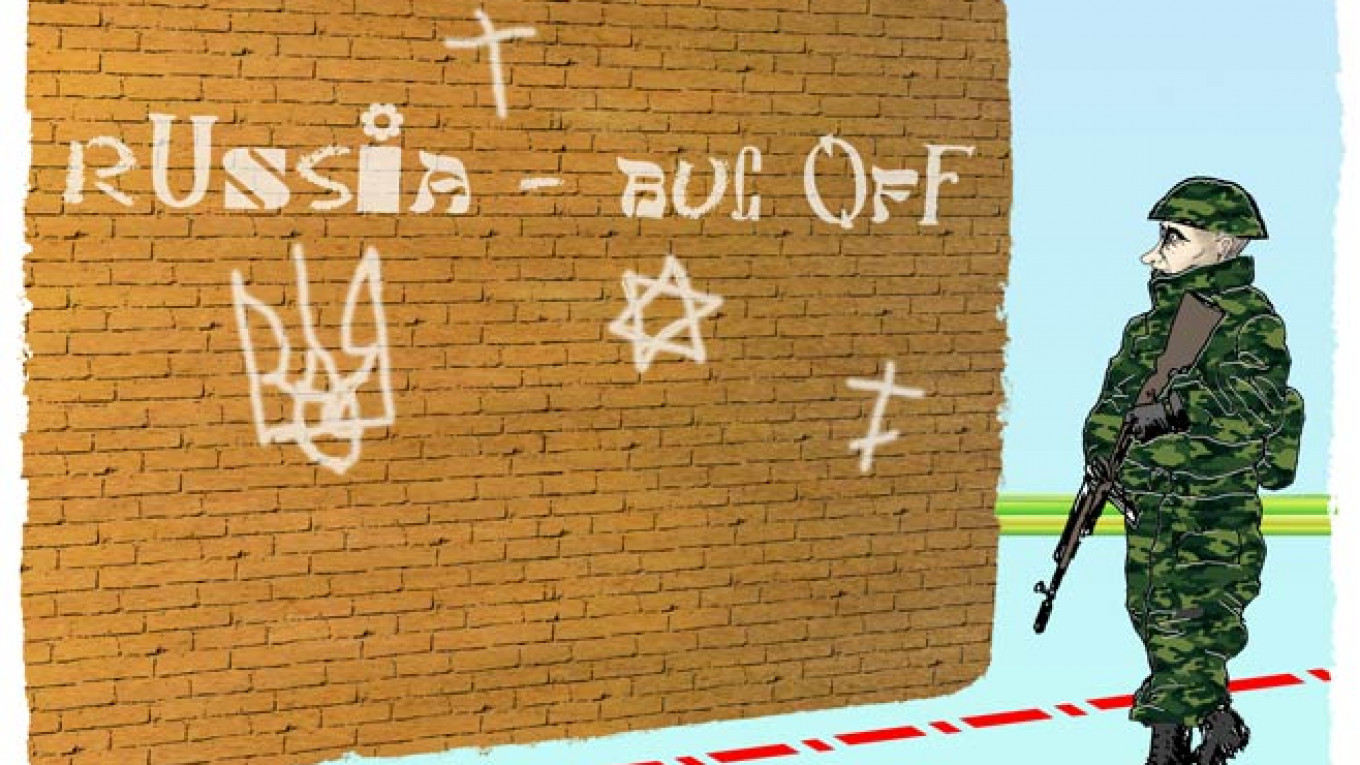On the morning of Feb. 28, Rabbi Mikhail Kapustin, head of the Crimean Jewish Reform congregation, discovered that the walls of the Simferopol synagogue had been defiled with the message "Death to the Kikes!" and swastikas. Kapustin did not wait for the threat to be carried out. He packed up the synagogue's most valuable objects and left for Kiev.
Appropriately, Russia's state-contolled RT television aired a piece about the "packing mood among Ukraine's Jews." Only they forgot to mention that the Crimean peninsula was already under the control of the "Crimean self-defense units" at the time. And RT failed to mention that the head of the Crimean Hasidic community, Itzhak-Meir Lifshitz, who was abroad when events began, decided not to return to Crimea.
For centuries Ukraine has had the reputation of being one of the epicenters of anti-Semitism. Many Ukrainians took part in the genocide of Jews during World War II. But since becoming an independent state, Ukraine is a showcase of how Jews and other nationalities can live peacefully and productively. The Maidan revolution, however, created a new situation where nationalistic radicals were able to take the stage, and Ukraine's Jewish community has been fearfully awaiting outbreaks of violence against them.
This was expected in Moscow, too. During his press conference on March 4, President Vladimir Putin said, "We see neo-Nazis, nationalists, and anti-Semites on rampages in parts of Ukraine, including Kiev." And as if by command, on March 14 in Kiev there was an attack on Rabbi Hillel Cohen, the head of the Ukrainian branch of the Hatzalah emergency services organization. The two perpetrators beat Cohen up and stabbed him, shouting insults with the word "kike" — in Russian, not Ukrainian. Cohen is, incidentally, a supporter of Maidan and even spoke on the stage there during the ecumenical prayer service led by leaders of Ukraine's religious confessions.
On the night of April 8, while pro-Russian activists stormed state buildings in Donetsk and Luhansk, vandals painted swastikas and the message "Death to the Kikes" on dozens of houses in Odessa. On that same night, the Jewish section of the local cemetery was defiled with fascist symbols.
What followed was dubbed by the bloggers as "what Foreign Minister Sergei Lavrov imagines as hell." Valery Zavgorodny, a representative of the nationalistic Right Sector and commander of the Ukrainian national self-defense organization, came to Odessa, where he met with the chief rabbi of Odessa and the south of Ukraine, Abraham Wolf. Zavgorodny condemned the acts of vandalism and said that it was a matter of honor for the Right Sector to find and punish those who defaced the Jewish cemetery. He also offered the rabbi assistance in protecting Jewish property in the city. The next day together Zavgorodny and Wolf painted over the swastikas and anti-Semitic graffiti on the walls.
These events show how the picture of Ukrainian reality created in the Kremlin and transmitted on their state-controlled television channels differs from the actual reality in Ukraine. It takes someone with a great imagination to find "anti-Semitism on a rampage" in a country where the deputy prime minister and several governors are Jews, and the leading candidate for the upcoming presidential election, oligarch Petro Poroshenko, is also Jewish.
In a letter to Putin, the Association of Jewish Organizations and Communities of Ukraine wrote, "We know that the political opposition consists of various groups, including some that are nationalistic. But even the most marginal of them do not demonstrate anti-Semitism or other forms of xenophobia. And we know for certain that these few nationalists are under the tight control of civil society and the new Ukrainian authorities."
Ukraine's chief rabbi, Yaakov Dov Bleich, declared that the main danger for Jews in Ukraine is not posed by Ukrainian nationalists but Russian provocations. In a press conference during a visit to the U.S., Bleich said, "We expect provocations. We expect that Russians will want to justify their incursion into Ukraine. Even now they are stating that followers of Bandera are running wild and attacking synagogues. This is totally false."
Ukraine is not only home to Ukrainians, Russians and Jews. There are another dozen national and ethnic groups living there. It appears that with his clumsy methods of force, Putin has achieved the exact opposite of the schism among various ethnic groups he wanted. The situation is still unstable, but today a unified Ukrainian nation is beginning to appear, regardless of what language people speak or what religion they profess.
A short version of the motto of this nation was proposed by the Ukrainian writer Les Podervyansky: "We Ukrainians have a very simple national idea: Russia — bug off."
Victor Davidoff is a Moscow-based writer and journalist who follows the Russian blogosphere in his biweekly column.
A Message from The Moscow Times:
Dear readers,
We are facing unprecedented challenges. Russia's Prosecutor General's Office has designated The Moscow Times as an "undesirable" organization, criminalizing our work and putting our staff at risk of prosecution. This follows our earlier unjust labeling as a "foreign agent."
These actions are direct attempts to silence independent journalism in Russia. The authorities claim our work "discredits the decisions of the Russian leadership." We see things differently: we strive to provide accurate, unbiased reporting on Russia.
We, the journalists of The Moscow Times, refuse to be silenced. But to continue our work, we need your help.
Your support, no matter how small, makes a world of difference. If you can, please support us monthly starting from just $2. It's quick to set up, and every contribution makes a significant impact.
By supporting The Moscow Times, you're defending open, independent journalism in the face of repression. Thank you for standing with us.
Remind me later.


